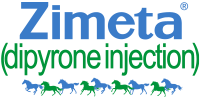ORDER NOW!
Contact your Dechra or Distributor Representative or call (866) 683-0660.
Resources
Technical Bulletins
NSAIDs in the Horse
Learn more about nonsteroidal anti-inflammatory drugs (NSAIDs) as a pharmaceutical class and approved uses in horses.
Fever: Pathways and Antipyretic Mechanisms
This technical bulletin reviews the pathways of fever and reviews the range of clinical effects of NSAIDs.
Veterinary Insights
Transport-Related Pyrexia in Horses
Read more about how transportation of horses can have multiple physiological effects that contribute to pyrexia.
Etiology of Fever
This technical bulletin discusses reasons for elevated body temperature and causes of fever in horses.
Pathogenesis of Fever
Read more about how fever in horses is defined and the complex cascade of events that occur within a febrile horse.
Sign up to receive future communications about Zimeta
For more information:
Contact your Dechra Representative
or call (866) 683-0660.
To place an order now:
Contact your Dechra Representative, Distributor Representative, or call (866) 683-0660.
Zimeta is indicated for the control of pyrexia in horses
As with all drugs, side effects may occur. Zimeta®(dipyrone injection) should not be given more frequently than every 12 hours due to the prolongation of prothrombin time (PT) and associated clinical signs of coagulopathy. For use in horses only. Do not use in horses with a hypersensitivity to dipyrone, horses intended for human consumption or any food producing animals, including lactating dairy animals. Not for use in humans, avoid direct contact with skin and keep out of reach of children. Care should be taken to avoid accidental self-injection and routine precautions should be used when handling and using loaded syringes as dipyrone can cause a deficiency in specific white blood cells in humans. Prior to use, horses should undergo a thorough history and physical examination by a veterinarian. Monitor for signs of abnormal bleeding and use caution in horses at risk for hemorrhage. Concurrent use with other NSAIDs, corticosteroids and drugs associated with kidney toxicity, should be avoided. Safety has not been evaluated in horses less than three years of age, horses used for breeding, or in pregnant or lactating mares. As a class, NSAIDs may be associated with gastrointestinal, kidney, and liver toxicity. The most common adverse reactions observed during clinical trials were elevated glucose conversion enzymes, decreased blood protein, gastric ulcers, inflamed or reddened lining of the right dorsal colon, and increased clotting times. Please see product insert for full prescribing information or visit www.dechra-us.com.
Zimeta® is a registered trademark of Kindred Biosciences, Inc. in the United States and/or other countries.
© 2021 Dechra Veterinary Products, LLC. All rights reserved.

